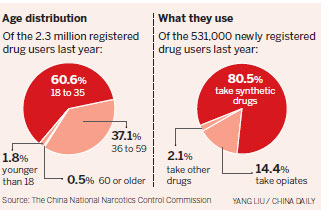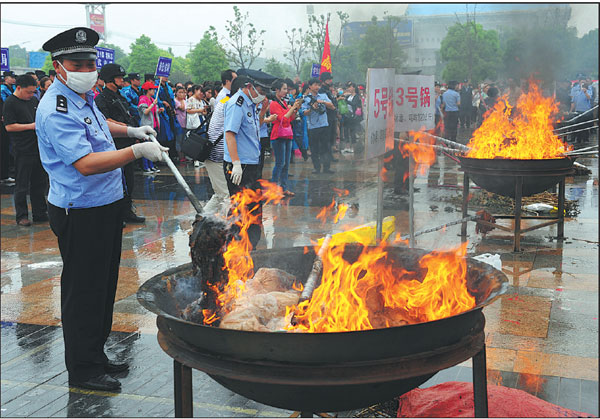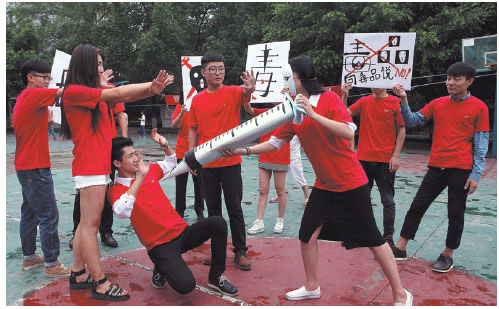The 'legal highs' that leave users feeling low
Updated: 2016-04-19 07:38
By Zhang Yi(China Daily)
|
|||||||||
China's teenagers face a growing threat from a new class of drugs called New Pyschoactive Substances that are easy to manufacture and obtain. Zhang Yi reports.
Zhang Ling (not his real name) will never forget the evening he walked into a club and consumed what he thought was a regular soft drink.
Eight years later, he is still suffering the consequences of the instant euphoria brought on by the 50 yuan ($7.70) drink, which contained a powerful "legal high". He now lives in a voluntary drug rehabilitation center in Beijing, attempting to overcome an addiction triggered by the bottle of "Cough Syrup", a preparation that contained large amounts of codeine.
"I never thought it would be so easy to get addicted to codeine, which was classified as a Category II psychotropic substance under China's medical regulations on May 1 last year. Now, it's impossible to get cough medicine containing codeine without a doctor's prescription, but a few years ago, cough syrups were freely available at most convenience stores," he said.
"I was 14 when I drank that first bottle of 'Cough Syrup' at the club, and I quickly began to feel the need to feel euphoric again. A couple days later, I found the drink in an adult store near my home. It was sold at 17 yuan a bottle, and, once hooked, I couldn't give it up."
Zhang's case is not an isolated one. Many teenagers have inadvertently found themselves caught up in new types of illicit drugs, which are usually synthesized in illegal laboratories.
About 80 percent of the 531,000 new drug users registered in China last year were addicted to synthetic drugs and other preparations, including a class of drugs known as New Psychoactive Substances, or NPS, according to the China National Narcotics Control Commission.
Social drugs
Unlike traditional illegal drugs, such as heroin and marijuana, NPS drugs use substances from a range of legal chemicals, medicinal materials and even plant extracts. Marketed as "legal highs" and intended for social use, they can be bought at entertainment venues or via online trading channels.
One typical example is 25i-NBOMe - N-bomb or 251 to use its street names. Last year, the drug, believed to be a synthetic form of LSD, was brought to the public's attention by an Australian father who travelled to China to uncover the companies that exported the raw materials to Australia, leading directly to the death of his 16-year-old son.
Preston Bridge died after jumping off a second-floor balcony at a hotel in 2013. His father, Rod, believes the teenager was hallucinating after taking 25i-NBOMe and thought he could fly.
Rod Bridge claims that he approached two chemicals suppliers in Hefei, the capital of Anhui province. Bridge said he posed as a drugs boss and managed to record interviews with company representatives. He was accompanied by a crew from the Australian TV station Channel Nine who used a hidden camera to record the exchanges.
A video clip, which went viral online, showed how easy it was to obtain the raw materials for the drug, which was not registered as a Category II psychotropic substance at the time, meaning that it was not illegal to sell the chemicals for non-trade purposes.
According to Bridge, he was offered five different chemicals and was assured that they could be delivered to him in Australia. One deal involved more than 200 kg of raw materials, and Bridge was told that around 100 kg of the drugs were shipped into Australia every month.
Bridge said that he decided to travel to China because the Australian police failed to act on information he had given them about the Sino-Australian drugs trade.
Legal loopholes
Shi Jie, a drugs researcher at the China Synthetic Drugs Prevention and Control Commission, said these new types of drugs are designed to replicate the effects of illegal substances. Their use exploits legal loopholes that enable criminals to tweak the chemical structure, or misuse chemicals designed for medicinal purposes, to replace traditional illegal drugs.
Although manufacturers and vendors usually refer to these drugs as legal highs, many are now subject to strict controls. The manufacturers' main intention is to produce psychoactive substances that will allow them and users to evade the law.
The China National Narcotics Control Commission said it's impossible to estimate the scale and value of China's legal highs industry because of the vast number of chemicals that can be used to synthesize drugs. Given that China's chemicals industry is the biggest in the world, policing it is difficult and time-consuming.
NPS, usually added into soft drinks or made into pills, are now regarded as third-generation drugs, following the first generation of traditional opiates, such as heroin, and the second generation of synthetic drugs, such as methamphetamine.
Some of the most popular mixtures in China are called Cough Syrup, Milk Tea, Bath Salts or Arabian Tea. They can be taken legally when they first appear because the chemicals they contain are not listed as controlled substances.
"We weren't fully aware of the great dangers that NPS can bring to society," Shi said. She noted that a major side-effect of these substances is that they can promote an unstable mental condition and intense paranoia that can prompt users to attack those near them.
Historical anomaly
Most illegal drugs are actually legal medicines when prescribed by a physician and used correctly.
In 2011, the United Kingdom's Royal Pharmaceutical Society published a paper entitled "Drugs for Pleasure, Drugs for Pain?"
The authors asked: "Would you take a medicine containing morphine or cocaine if you were suffering from morning sickness? Sniff a cocaine-based powder if you had catarrh? Take heroin if you had bronchitis? The answer, if you are sensible and law abiding, is most likely to be no. However, medicines containing these substances were in the past viewed by medical professionals as legitimate and effective medicinal treatments."
Those comments also hold true for NPS.
New products have been hitting the streets at a rapid rate, and Chinese police have no legal grounds to arrest anyone who produces, trades or consumes them before they are listed as Category II psychotropic substances.
"Therefore, it is of great significance for authorities to discover new drug products and devise efficient regulations to place the new types of NPS under control," said Liu Yuejin, deputy head of the China National Narcotics Control Commission.
Immediately after cough medicine containing codeine was categorized as a controlled substance in May last year, police across the country began raiding "Cough Syrup" dealers. In the first five months after the preparation was proclaimed illegal, 52 cases relating to trading were broken up, and 65 people were detained in Shenzhen, Guangdong province.
Tougher regulations
The State Food and Drug Administration is providing training for legitimate pharmaceutical companies that produce cough medicines, and they are now required to apply for a license to continue manufacturing the treatment.
By December 2014, a total of 541 NPS had been detected in 95 countries and territories, according to the World Drug Report 2015, published by the United Nations Office on Drugs and Crime. Of those, 244 have been classified as illegal substances by the UN.
By the end of last year, China had listed 116 additional types of NPS as illegal substances, bringing the total to about 230 by November, according to the narcotics control commission.
In November, the commission started a joint operation with Australian police to clamp down on the drugs trade between the two countries. So far, operations in both countries have netted 60 suspects, more than 2 metric tons of drugs have been confiscated and nearly 3.4 tons of drug-making materials have been impounded.
However, police are still finding it a challenge to curb the use of these new types of drugs.
According to Liu, the commission has discovered that the online trade in illicit drugs is gaining momentum.
Last year, Chinese police broke up 15,000 cases of online drugs trading. More than 4 tons of drugs were seized, and 832 drug-dealing websites and more than 5 million social media accounts were closed by the authorities. In addition, nearly 1,500 websites relating to the drugs trade outside the country were blocked.
Easy access to drugs via the internet has resulted in a rise in the number of teenager drug abusers, according to Liu Ning, an officer at a rehabilitation center for minors in Anhui province.
He said teenagers can buy drugs using smartphones. All it takes is a few clicks on popular social-media platforms, and packages marked "Coffee" or "Milk Tea" will be delivered to their doorsteps.
"It's extremely difficult to detect illegal drugs mixed as powders in coffee and milk tea delivered by courier services. So we need to eradicate drugs from the manufacturing process and step up supervision of the logistics of the raw materials. Otherwise, we'll face a tsunami of new types of drugs," he said.
Contact the writer at zhang_yi@chinadaily.com.cn
Number of young users rises
Since 2005, about 750 metric tons of drugs have been seized, and 1.15 million suspects have been arrested in relation to more than 1 million drug crimes nationwide, according to the latest report from the National Narcotics Control Commission.
The report said the authorities have virtually eliminated the cultivation of opium poppies by deploying remote-sensing satellites to spot small plantations, which are then destroyed.
Last year, there were 2.3 million registered users of illegal drugs in China, a fall of 20 percent from 2014. However, the number of young people using illegal drugs rose, accounting for 62 percent of registered users nationwide.
China now has 57 drug rehabilitation centers and 27,000 full-time social workers involved in rehabilitation and control.
In 1990, the National Narcotics Control Commission was established under the auspices of the Public Security Ministry. The commission now has 38 associates (or members), including the National Health and Family Planning Commission and the General Administration of Customs.

|
Police officers destroy more than 100 kilograms of confiscated heroin, morphine and other illegal drugs on June 3 in Fuyang, Anhui province. Wang Biao / For China Daily |
|
|
(China Daily 04/19/2016 page6)
Today's Top News
China says financial crisis caused weakening global steel demand
Embryos growing in space a 'giant leap'
Russia to defend regional security jointly with China
Passage to piraeus
In the hall of the great frescoes
World Bank joins AIIB on financing for joint projects
GM seeds to get oversight
Russia-China ties benefit both countries, peoples
Hot Topics
Lunar probe , China growth forecasts, Emission rules get tougher, China seen through 'colored lens', International board,
Editor's Picks

|

|

|

|

|

|









